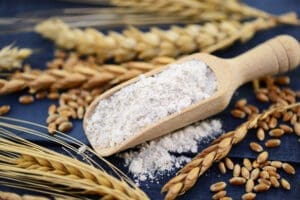Exploring the Nutritional Benefits of Milled Baking Goods
Published on August 20, 2024
As consumers have focused on adopting healthier lifestyles, there has been a growing interest in the nutritional benefits of using milled baking goods in home baking. Milled baking goods, like cornmeal and whole wheat flour, are versatile ingredients that provide a wealth of nutrients and enhance the healthfulness of your homemade creations. Whether baking for friends or family, incorporating these ingredients into your recipes can add flavor, texture, and nutritional value to your baked goods.
 Understanding Milled Baking Goods
Understanding Milled Baking Goods
Milled baking goods are products obtained by grinding grains into a fine powder. The milling process can vary, producing different textures and nutritional profiles. Common products include cornmeal, whole wheat flour, and other specialty flours like rye and oat flour. Unlike refined white flour, which has been stripped of most nutrients during processing, milled baking goods retain more natural vitamins, minerals, and fiber.
Cornmeal: A Nutrient-Rich Staple
Cornmeal is a versatile ingredient made from ground, dried corn kernels. It is a staple in many cultures and is commonly used to make cornbread, muffins, pancakes, and more. One of the key nutritional benefits of cornmeal is its high fiber content. A single serving of cornmeal can provide a significant portion of your daily fiber needs, promoting healthy digestion and helping to maintain stable blood sugar levels.
Cornmeal is also a good source of essential nutrients, including iron, magnesium, and phosphorus. Iron is crucial for transporting oxygen in the blood, while magnesium and phosphorus play vital roles in bone health and energy production. Additionally, cornmeal contains antioxidants such as lutein and zeaxanthin, which are beneficial for eye health and may reduce the risk of age-related macular degeneration.
Whole Wheat Flour: A Wholesome Choice
Whole wheat flour is another excellent milled baking good that offers numerous health benefits. Made from the entire wheat kernel, this flour is rich in nutrients, including fiber, protein, vitamins, and minerals. One of the standout features of whole wheat flour is its high fiber content, which promotes satiety, aids digestion, and helps regulate blood sugar levels.
In addition to fiber, whole wheat flour is a good source of B vitamins, including thiamine, riboflavin, niacin, and folate. These vitamins are essential for energy metabolism, brain function, and overall well-being. Whole wheat flour also contains minerals like selenium, manganese, and zinc, contributing to immune function and antioxidant defense.
Health Benefits of Incorporating Milled Baking Goods into Your Diet
1. Improved Digestive Health: The high fiber content in milled baking goods like cornmeal and whole wheat flour supports a healthy digestive system. Fiber adds bulk to the stool, promoting regular bowel movements and preventing constipation. A fiber-rich diet is also associated with a reduced risk of colon cancer.
2. Better Blood Sugar Control: These products have a lower glycemic index than refined white flour. This means they cause a slower, more gradual rise in blood sugar levels, making them a better choice for individuals with diabetes or those looking to manage their blood sugar levels.
3. Enhanced Heart Health: The fiber and nutrients found in fresh, milled goods can contribute to heart health. Soluble fiber, in particular, can help lower cholesterol levels by binding to cholesterol molecules and removing them from the body. This can reduce the risk of heart disease and stroke.
4. Increased Nutrient Intake: These products can increase the nutrient density of your baked goods. This means you can enjoy delicious treats while also providing your body with essential vitamins and minerals necessary for optimal health.
Tips for Baking with Milled Baking Goods
When incorporating milled baking goods into your home baking, here are some tips to keep in mind:
Experiment with Ratios: Start by substituting a portion of refined white flour with milled flour in your recipes. For example, half of the white flour should be replaced with whole wheat flour to add nutritional benefits without significantly altering the texture.
Combine Flours: Mixing different milled goods can enhance both flavor and nutrition. Try combining cornmeal with whole wheat flour for a unique taste and added health benefits.
Adjust Liquid Ingredients: Milled baking goods can absorb more moisture than refined flour, so you may need to adjust the amount of liquid in your recipes to achieve the desired consistency.
Use Fresh Ingredients: For the best flavor and nutritional value, use fresh, high-quality milled baking goods like those available from the Butte Creek Mill’s online General Store. Store them in a cool, dry place to preserve their freshness.
Visit our Online General Store for the Best Baking Products
Incorporating milled baking goods like cornmeal and whole wheat flour into your home baking can significantly enhance the nutritional profile of your creations. These ingredients provide a rich source of fiber, vitamins, minerals, and antioxidants that contribute to overall health and well-being. You can create delicious and nutritious baked goods that will delight your friends and family by making simple substitutions and experimenting with different recipes. Whether you’re baking bread, muffins, or pancakes, milled baking goods offer a wholesome and flavorful way to nourish your loved ones.
Visit the Butte Creek Mill to find the most wholesome foods for your family. Stop by the Mill in Eagle Point, Oregon, and witness one of the oldest operational grain mills in the country before you visit our General Store. Or, shop the store online and have your products delivered right to your door. Either way, you’ll feel great about providing your family with healthier meals and baked goods.

Wonderful dietary information. Love receiving your emails full of good information, tips, etc.
Having been a customer at the mill has been a good, reliable source of natural products. Thank you
Thank YOU! We’re thrilled you find our website valuable! Thanks for supporting the Mill!